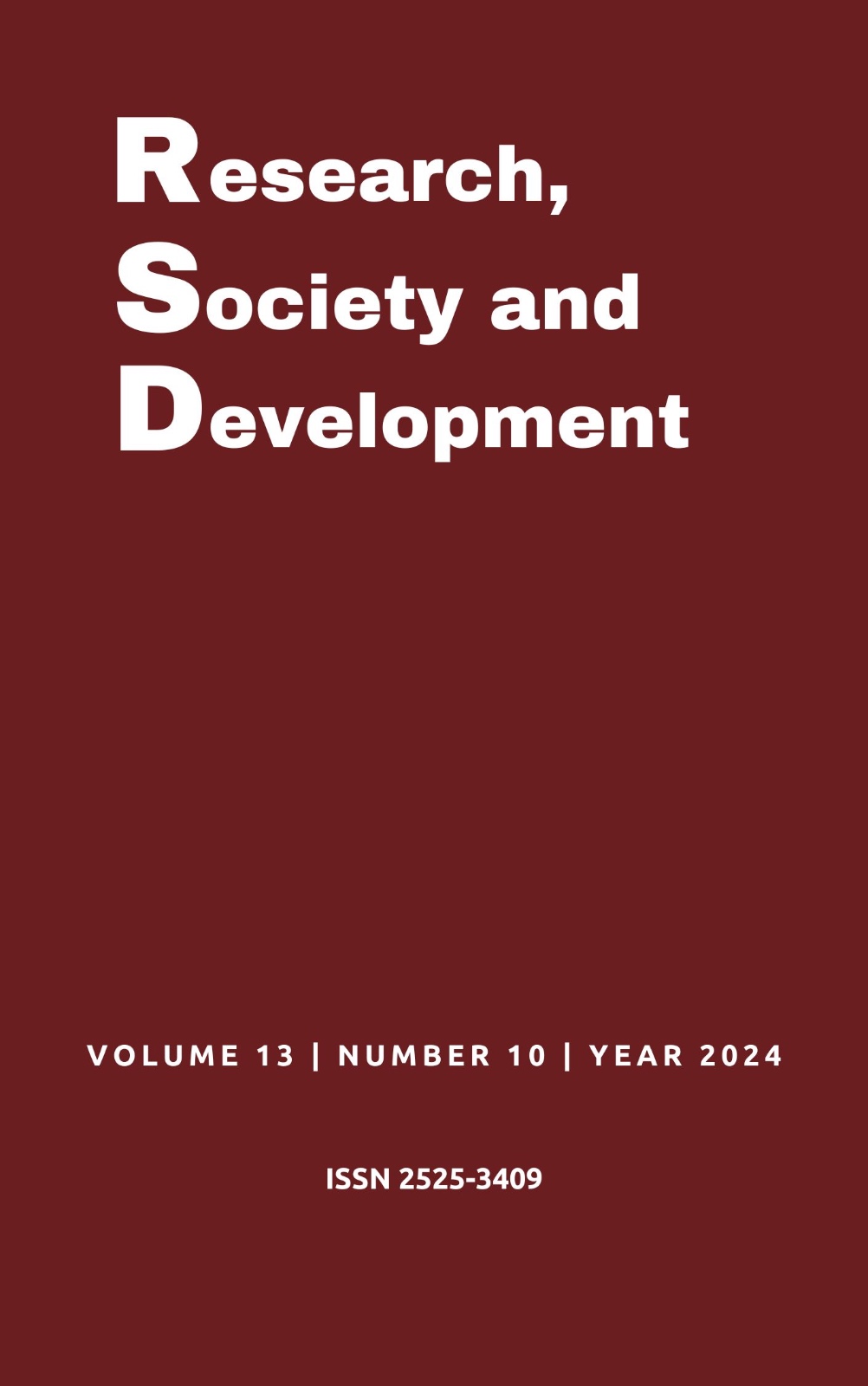Políticas públicas de resíduos sólidos e inovação tecnológica ambiental: Revisão narrativa sobre a implementação da logística reversa
DOI:
https://doi.org/10.33448/rsd-v13i10.47002Palavras-chave:
Logística reversa, Gerenciamento de resíduos, Políticas públicas.Resumo
Objetivo: analisar como as políticas públicas podem ser direcionadas para mitigar os desafios da implementação da logística reversa em países em desenvolvimento, com ênfase na inovação sustentável. Metodologia: Utilizou-se o método de Revisão Narrativa da Literatura para compor o estado da arte por meio de busca e seleção de artigos científicos na biblioteca eletrônica Scientific Electronic Library Online, desde que abordassem a implementação de políticas públicas ambientais relacionadas à logística reversa e à inovação sustentável. Foram selecionados 11 artigos que atenderam a esses critérios. Resultados: Após leitura, análise crítica e síntese dos materiais pesquisados e selecionados, os resultados encontrados destacaram a importância da ecoinovação e da engenharia sustentável como ferramentas para aprimorar a eficiência na gestão de resíduos, propondo ajustes nas políticas públicas para superar as barreiras identificadas. Conclusão: a adoção de tecnologias emergentes e a integração de cooperativas são estratégias essenciais para fortalecer a logística reversa e promover práticas sustentáveis, alinhadas com os Objetivos de Desenvolvimento Sustentável.
Referências
Akabane, G. K.& Pozo, H (2020). Inovação, tecnologia e sustentabilidade: histórico, conceitos e aplicações. Érica.
Alós, J. D. S., Milan, G. S., & Eberle, L. (2023). The reverse logistics operation of solid waste pos-consumption of electronic products for domestic use in Brazil. Revista de Administração Da UFSM, 16(3), e2.
Bernardo, O. O., Souza, M. T. S. D., & Demajorovic, J. (2020). Inovação na cadeia reversa de resíduos eletroeletrônicos: um estudo sobre os sistemas de informação e as tecnologias de rastreamento. Revista de Administração de Empresas, 60(4), 248–261.
Brasil (1981). Política Nacional de Meio Ambiente, seus fins e mecanismos de formulação e aplicação, e dá outras providências. Brasília, DF: Presidência da República, from https://www.planalto.gov.br/ccivil_03/leis/l6938.htm
Brasil (2010). Política Nacional de Resíduos Sólidos; altera a Lei no 9.605, de 12 de fevereiro de 1998; e dá outras providências. Presidência da República, from https://www.planalto.gov.br/ccivil_03/_ato2007-2010/2010/lei/l12305.htm.
Brasil (2022). Ministério do Meio Ambiente. Plano Nacional de Resíduos Sólidos. Recuperado de https://portal-api.sinir.gov.br/wp-content/uploads/2022/07/Planares-B.pdf
Brasil, (2023). Certificado de Crédito de Reciclagem de Logística reversa, o Certificado de Estruturação e Reciclagem de Embalagens em Geral e o Certificado de Crédito de Massa Futura, no âmbito dos sistemas de logística reversa de que trata o art. 33 da Lei nº 12.305, de 2 de agosto de 2010. Presidência da República, from https://www.in.gov.br/en/web/dou/-/decreto-n-11.413-de-13-de-fevereiro-de-2023-464158637.
Cavalcante, L. T. C. & Oliveira, A. A. S. (2020). Métodos de revisão bibliográfica nos estudos científicos. Psicol. Rev. 26 (1). https://doi.org/10.5752/P.1678-9563.2020v26n1p82-100
Conama (2008). Conselho Nacional do Meio Ambiente (2008). Resolução N° 257/1999, substituída pela Resolução 401/2008, de 04 de novembro de 2008. Publicada no Diário Oficial da União, from https://www.camara.leg.br/proposicoesWeb/prop_mostrarintegra?codteor=1097123.
Couto, M. C. L., & Lange, L. C. (2017). Análise dos sistemas de logística reversa no Brasil. Engenharia Sanitaria e Ambiental, 22(5), 889–898.
Demajorovic, J., Caires, E. F., Gonçalves, L. N. D. S., & Silva, M. J. D. C. (2014). Integrando empresas e cooperativas de catadores em fluxos reversos de resíduos sólidos pós-consumo: O caso Vira-Lata. Cadernos EBAPE.BR, 12(spe), 513–532.
Guimarães, R., Morel, C. M., Aragão, É., Paranhos, J., Palácios, M., Goldbaum, M., Gadelha, P., & Kropf, S. (2021). Política de Ciência, Tecnologia e Inovação em Saúde (CT&I/S): Uma atualização para debate. Ciência & Saúde Coletiva, 26(12), 6105–6116.
Heinrichs, H.; Martens, P. & Wiek, A. (2016). Sustainability science. Dordrecht: Springer.
Lima, S. R. L. B. D., Amaral, V. S. D., & Navoni, J. A. (2023). Logística reversa de medicamentos no Brasil: Uma análise socioambiental. Estudos Avançados, 37(109), 159–178.
Mathias, R. V. (2021). Management of solid waste from health services according to the National Solid Waste Policy: A study conducted in the South of the Brazil. Gestão & Produção, 28(4), e5727
May, P. H. (2018). Economia do meio ambiente: teoria e prática. (3ª ed.). Elsevier.
Organização para a Cooperação e Desenvolvimento Econômico (OCDE). (2005). Manual de Oslo: Diretrizes para a coleta e interpretação de dados sobre inovação (3ª ed.). OCDE.
Paranhos, J., Cataldo, B., & Pinto, A. C. D. A. (2018). Criação, institucionalização e funcionamento dos núcleos de inovação tecnológica no brasil: características e desafios. REAd. Revista Eletrônica de Administração (Porto Alegre), 24(2), 253–280.
Rother, E. T. (2007). Revisão sistemática x revisão narrativa. Acta paul. enferm. 20 (2). https://doi.org/10.1590/S0103-21002007000200001.
Schreiber, D., Sander, S. C., & Becker, V. J. (2023). Analysis of the feasibility of reverse logistics in footwear production employing technologies RFID and Cloud Computing. Revista de Administração Da UFSM, 16(3), e6.
Silva, A. L. E., Moraes, J. A. R., & Machado, Ê. L. (2015). Proposta de produção mais limpa voltada às práticas de ecodesign e logística reversa. Engenharia Sanitaria e Ambiental, 20(1), 29–37.
Souza, J. V. R (2022). Inovação tecnológica e meio ambiente. Platos Soluções Educacionais S.A.
Souza, M. T. S. D., Paula, M. B. D., & Souza-Pinto, H. D. (2012). O papel das cooperativas de reciclagem nos canais reversos pós-consumo. Revista de Administração de Empresas, 52(2), 246–262.
Downloads
Publicado
Edição
Seção
Licença
Copyright (c) 2024 Ladielson Alves da Silva; Luísa Cristina Oliveira Silva

Este trabalho está licenciado sob uma licença Creative Commons Attribution 4.0 International License.
Autores que publicam nesta revista concordam com os seguintes termos:
1) Autores mantém os direitos autorais e concedem à revista o direito de primeira publicação, com o trabalho simultaneamente licenciado sob a Licença Creative Commons Attribution que permite o compartilhamento do trabalho com reconhecimento da autoria e publicação inicial nesta revista.
2) Autores têm autorização para assumir contratos adicionais separadamente, para distribuição não-exclusiva da versão do trabalho publicada nesta revista (ex.: publicar em repositório institucional ou como capítulo de livro), com reconhecimento de autoria e publicação inicial nesta revista.
3) Autores têm permissão e são estimulados a publicar e distribuir seu trabalho online (ex.: em repositórios institucionais ou na sua página pessoal) a qualquer ponto antes ou durante o processo editorial, já que isso pode gerar alterações produtivas, bem como aumentar o impacto e a citação do trabalho publicado.


